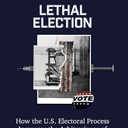
The U.S. federal government ended its 17-year hiatus between executions on July 14, 2020, putting Daniel Lewis Lee (pictured) to death moments after overnight rulings by the U.S. Supreme Court and the U.S. Court of Appeals for the Eighth Circuit vacated prior court orders that had placed the execution on hold. Two more executions are scheduled this week, with a fourth set for August.
Although Lee’s death warrant expired at midnight on July 13, the federal Bureau of Prisons (BOP) attempted to start his execution at 4:00 a.m. on the 14th, after the U.S. Supreme Court had vacated a preliminary injunction entered by a federal district court in Washington, D.C. Notified by defense counsel that a stay of execution was still in effect from an Arkansas federal court ruling in December 2019, the BOP left Lee strapped to the execution gurney for four hours while federal prosecutors filed motions in the Eighth Circuit to terminate the stay. The appeals court lifted the stay at 6:36 a.m. Central time, 7:36 a.m. in the execution chamber in Terre Haute, Indiana. Federal law requires the Bureau of Prisons to set a new execution date if a stay of execution is lifted after a prior death warrant expires. But without notifying defense counsel, the BOP commenced the execution, injecting Lee with a fatal dose of the drug pentobarbital. He was pronounced dead at 8:07 a.m. Eastern.
The Bureau of Prisons released a one-page document it said had provided Lee with the required legal notice of his new execution date, though he was provided no opportunity to speak with counsel or contest the BOP’s adherence to required protocols before he was executed. “The federal government just executed a prisoner in violation of the law,” DPIC Executive Director Robert Dunham said. “And if their actions could be construed as complying with federal regulations, the regulations were unconstitutional.”
According to a statement by Lee’s attorney, Ruth Friedman, Lee was executed with multiple motions in his case still pending, and without notice to his attorneys. Friedman wrote, “It is shameful that the government saw fit to carry out this execution during a pandemic. It is shameful that the government saw fit to carry out this execution when counsel for Danny Lee could not be present with him, and when the judges in his case and even the family of his victims urged against it. And it is beyond shameful that the government, in the end, carried out this execution in haste, in the middle of the night, while the country was sleeping. We hope that upon awakening, the country will be as outraged as we are.”
Lee had been scheduled for execution on July 13, with the authorization to put him to death expiring at midnight. Early in the day, a federal district court in Washington, D.C. had issued a preliminary injunction barring all four executions on the grounds that the prisoners were likely to prevail on their challenge to the constitutionality of the execution protocol. Federal prosecutors filed simultaneous motions in the U.S. Court of Appeals for the District of Columbia Circuit and the United States Supreme Court seeking to vacate the injunction. As the midnight deadline approached, the appeals court denied the motion, and set an expedited briefing schedule to consider the merits of the district court’s ruling. That schedule, however, extended beyond July 17, effectively halting the first three scheduled executions.
Hours later, around 2:30 am on July 14, the U.S. Supreme Court vacated the district court injunction by a 5 – 4 vote. In an unsigned opinion, the five conservative justices wrote that last-minute stay applications were disfavored and that the prisoners had not met the “exceedingly high bar” of establishing that they could show that executions using pentobarbital constitute cruel and unusual punishment.
Justice Sotomayor, joined by Justices Ginsburg and Kagan, dissented from the decision, writing that “hastily” denying the prisoners’ challenge “accepts the Government’s artificial claim of urgency to truncate ordinary procedures of judicial review” and “sets a dangerous precedent.” She continued, “the grant of the Government’s emergency application inflicts the most irreparable of harms without the deliberation such an action warrants.” Justice Stephen Breyer, joined by Justice Ginsburg, renewed his call for an examination of the constitutionality of the death penalty. He wrote, “the resumption of federal executions promises to provide examples that illustrate the difficulties of administering the death penalty consistent with the Constitution. As I have previously written, the solution may be for this Court to directly examine the question whether the death penalty violates the Constitution.”
Immediately after the Court’s decision was issued, the Department of Justice (DOJ) began calling execution witnesses back to the federal prison in Terre Haute, Indiana, where the execution was set to take place. Witnesses were told that the execution would take place at 4 am. Lee’s attorneys responded with a letter informing the Bureau of Prisons that a mandate from the District Court of the Eastern District of Arkansas, lifting an earlier stay in the case, had not yet issued, meaning that the execution was still legally stayed. At 7:36 am Eastern time, the U.S. Court of Appeals for the Eighth Circuit, in response to an emergency motion filed by the DOJ, granted an expedited mandate allowing the execution to proceed. Thirty-one minutes later, Daniel Lee was declared dead.
Mark Berman, Trump administration carries out first federal execution since 2003 after late-night Supreme Court intervention, The Washington Post, July 14, 2020; Tim Evans, ‘You’re killing an innocent man’: Daniel Lewis Lee executed in Terre Haute federal prison, Indianapolis Star, July 14, 2020; Chris Geidner (@chrisgeidner), Twitter thread, July 13 – 14, 2020; Statement of Ruth Friedman, July 14, 2020; Letter from Federal Capital Habeas Project to Katherine N. Siereveld, July 14, 2020.
Read the U.S. Supreme Court’s per curiam decision and dissenting opinions in Barr v. Lee.
For links to additional filings and decisions in Lee’s case and the other cases scheduled for execution during the week of July 13, visit DPIC’s Federal Execution Updates page.



